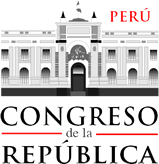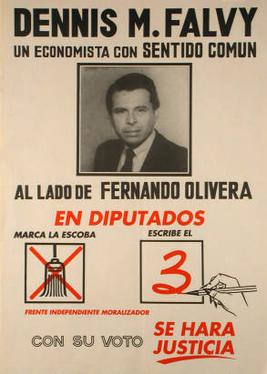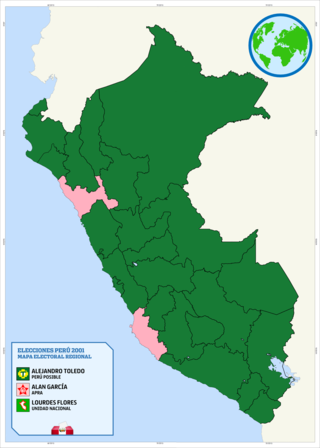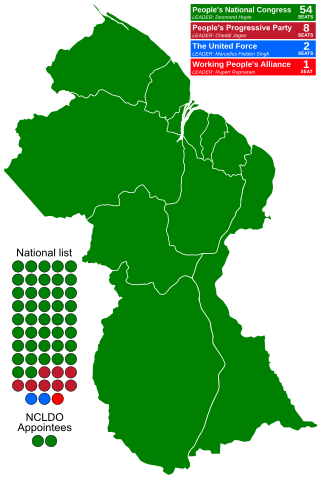
The politics of the Republic of Peru takes place in a framework of a unitary semi-presidential representative democratic republic, whereby the President of Peru is both head of state and head of government, and of a pluriform multi-party system. Executive power is exercised by the President and the Government. Legislative power is vested in both the Government and the Congress. The Judiciary is independent of the executive and the legislature. The Economist Intelligence Unit rated Peru a "flawed democracy" in 2021. Traditionally weak political parties saw their support collapse further in Peru since 2000, paving the way for the rise of personalist leaderships. The political parties in the congress of Peru are, according to political scientist Lucía Dammert, "agglomerations of individual and group interests more than solid and representative parties".

Cambio 90 was a Peruvian right-wing political party which entered the political spectrum in early 1990, and throughout the 1990s until late-2000 was the most powerful political party in Peru alongside New Majority, serving more as an instrumental electoral vehicle for Alberto Fujimori.

Alberto Kenya Fujimori Inomoto is a Peruvian statesman, professor and former engineer who was President of Peru from 28 July 1990 until 22 November 2000. Frequently described as a dictator, he remains a controversial figure in Peruvian politics; his government is credited with the creation of Fujimorism, defeating the Shining Path insurgency and restoring Peru's macroeconomic stability, though Fujimori ended his presidency by fleeing Peru for Japan amid a major scandal involving corruption and human rights abuses. Even amid his prosecution in 2008 for crimes against humanity relating to his presidency, two-thirds of Peruvians polled voiced approval for his leadership in that period.

The president of Peru, officially called the president of the Republic of Peru, is the head of state and head of government of Peru. The president is the head of the executive branch and is the Supreme Head of the Armed Forces and Police of Peru. The office of president corresponds to the highest magistracy in the country, making the president the highest-ranking public official in Peru. Due to broadly interpreted impeachment wording in the 1993 Constitution of Peru, the Congress of Peru can impeach the president without cause, effectively making the executive branch subject to the legislature.

The Popular Action is a liberal and reformist political party in Peru, founded by former Peruvian president Fernando Belaúnde Terry.

Elections in Guyana take place within the framework of a multi-party representative democracy and a presidential system. The National Assembly is directly elected, with the nominee of the party or alliance that receives the most votes becoming President.

The Congress of the Republic of Peru is the unicameral body that assumes legislative power in Peru.

The Independent Moralizing Front was a Peruvian political party. At the legislative elections, 8 April 2001, the party won 11.0% of the popular vote and 11 out of 120 seats in the Congress of the Republic. Its presidential candidate at the elections of the same day, Luis Fernando Olivera Vega, won 9.9% of the vote. It was allied with former Peruvian president Alejandro Toledo's party, Peru Possible.
A self-coup, sometimes known as the Fujimorazo, was performed in Peru in 1992 after President Alberto Fujimori dissolved the Congress as well as the judiciary and assumed full legislative and judicial powers. With the collaboration of the military, the Fujimori government subsequently began to implement objectives of Plan Verde following the coup.

Martha Gladys Chávez Cossío de Ocampo is a Peruvian Fujimorist politician and lawyer. A historical and a prominent figure of Fujimorism, she has served in Congress for six-non consecutive terms from 1995 to 2006 and from 2011 to 2016, and since 2020 to finish the 2016–2021 that was interrupted by the dissolution of Congress. In the 2006 elections, she ran for the presidency, running on the Fujimorist Alliance for the Future ticket, but she lost, placing fourth in the election.

Alliance for the Future was a Peruvian electoral alliance formed by pro-Fujimori parties Cambio 90, New Majority and Sí Cumple for the 2006 general election. Its presidential candidate was former President of the Congress and Congresswoman Martha Chávez Cossio.

Sí Cumple, until 2005 called Let's Go Neighbor, was a political party of Peru founded by Alberto Fujimori in 1998 in order for the party to participate in that year's municipal elections. Following the establishment of Popular Force in 2009 by Fujimori’s daughter Keiko, Sí Cumple ceased to exist in 2012, as their registration was cancelled by the National Jury of Elections for not participating in the 2011 general election. Most of its members ran for office with Popular Force, and ultimately switched their affiliations.

Early general elections were held in Peru on 8 April 2001, with a second round of the presidential election on 3 June. The elections were held after President Alberto Fujimori claimed asylum in Japan during a trip to Asia and resigned his position.

General elections were held in Peru on 9 April 2000, with a run-off of the presidential election on 28 May. The elections were highly controversial and widely considered to have been fraudulent. Incumbent President Alberto Fujimori was re-elected for a third term with almost three-quarters of the vote. However, the elections were tainted with allegations of unconstitutionality, bribery, structural bias, and outright electoral fraud. Alejandro Toledo boycotted the second round of the presidential election, in which over 30% of ballots were declared invalid. Fujimori subsequently called for new elections, fled Peru, and faxed in his resignation from a hotel in Japan.

General elections were held in Peru on 9 April 1995, the first under the 1993 constitution. Incumbent President Alberto Fujimori was easily re-elected with 64.4% of the vote defeating former UN Secretary General Javier Pérez de Cuéllar, whilst his Cambio 90-New Majority alliance won a majority of seats in the newly unicameral Congress.

Peru 2000 was a Peruvian right-wing political alliance that fielded candidates for the 2000 general elections. Alberto Fujimori and his political allies ran on the Peru 2000 ticket in which, Fujimori was triumphant in his second re-election as President for a third term amid public discontent.

A constitutional referendum was held in Chile on 30 July 1989. The proposed changes to the constitution were approved by 87.7% of voters.

Elections for the House of Representatives of the Philippines were held on April 23, 1946. Held on the same day as the presidential election, it was held after the Nacionalista Party had split permanently into two factions: the "conservative" faction headed by president Sergio Osmeña and the "liberal" faction headed by Senate president Manuel Roxas, which later became the Liberal Party. Roxas and the Liberals won the elections, leaving the Nacionalistas with the minority in both houses of Congress.

New Majority, was a Peruvian right-wing political party founded in 1992 for the Democratic Constituent Congress election held on the same year. and throughout the 1990s until late-2000 was the most powerful political party in Peru alongside Cambio 90, serving more as an instrumental electoral vehicle for Alberto Fujimori.

General elections were held in Guyana on 9 December 1985. The result was a victory for the People's National Congress, which won 42 of the 53 directly-elected seats. However, the elections were marred by fraud and the People's Progressive Party and Working People's Alliance withdrew on election day. Voter turnout was 73.8%.





















